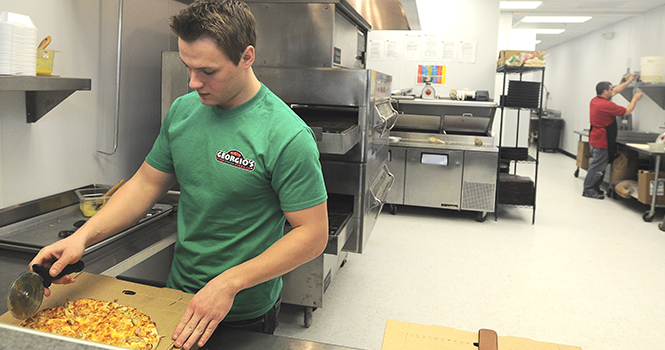Free samples on and off campus
Josh Kostraba, senior accounting and management major, prepares a pizza in Georgio’s, a new pizza parlor in dowtown Kent that gives away free food for promotion, on March 3, 2013. Photo by Jacob Byk.
March 11, 2013
Companies come on and off campus to shower Kent State students with free product samples, often hiring students to distribute the products while interacting with their peers.
Free cans of Red Bull are sometimes given out to students in the library, while cleaning products and toiletries are distributed in the Student Center. Camel Cigarettes, Three Olives and Jagermeister are three companies that have given out free samples of their products at locations off campus in Kent.
“Sampling” is a term used in the marketing industry when a company gives away free products. A company will use this technique when it wants people to adopt its brand and make it their brand for life.
Paul Albanese, marketing and entrepreneurship professor, said giving the consumer a product is the first stage in the marketing process, but it is also the hardest.
“It’s a proactive approach to reach out to the consumer,” Albanese said. “When there’s sampling, the company is not just handing [its products] to anyone. They have a profile in mind of who would be good prospects.”
Albanese said sampling is part of a much larger marketing strategy. This technique is meant to create committed life-long customers.
ReadyU, a program created by Procter & Gamble, hires college students to distribute product samples on college campuses.
ReadyU ambassador Erik Clarke, sophomore managerial marketing major, said college freshmen are ideal targets because they are likely to keep using the product after trying a sample.
“We give freshmen products to get them ready for the college experience,” Clarke said.
ReadyU often sets up in high-traffic areas on campus like the Student Center and allows free P&G product giveaways with brands such as Tide, Duracell, Febreze, Swiffer, Venus, Olay, Secret, Herbal Essences, Cover Girl, Crest, Old Spice and Gillette.
Marketing instructor Denise Easterling said places that have the most students passing through are the best places for sampling. Sampling in high-traffic areas gives a company a better chance of creating more committed customers. This makes handing out free products worth the financial cost of giving the products away.
“A lot of companies have looked at the cost of paid advertising,” Easterling said. “They’re better at giving away free products because it’s cheaper and more effective. And if they target who they put the product in the hands of, they get a customer rather than an ad.”
Georgio’s Pizza opened in Kent Feb. 20 and conducted a free product giveaway off campus. The first 500 students who came in to the restaurant received a free small cheese pizza. Although the giveaway cost the company money — pizza boxes alone cost 50 cents — the company views sampling as a more effective form of advertising. “We have to have people try our product so people know what they’re getting,” manager Eric Stauffer said. “I think giving away free products is a stronger form of advertising than print media, but we believe in that also.”
Georgio’s also offers free pepperoni pizza samples to any campus organization, and friending the company on Facebook results in a free order of breadsticks.
Students, like Jessica Grotemeyer, sophomore fashion design major, have received various free products from outside businesses. Grotemeyer said she thinks it can be an effective way for a company to advertise.
“I usually get T-shirts and cups, so it’s useful,” Grotemeyer said. “It’s effective sometimes. I received stuff from apartment places and ended up looking at those apartments.”
Ryan Rankin, sophomore theatre major, said sampling is a good incentive to try to get someone to buy something. However, it can be risky.
“If something is good, someone, on average, will tell about three people,” Rankin said. “If something is bad, someone will tell 10 people.”
There is a cost involved, but when looking at the bigger picture, customer loyalty and the data a company receives allows the company to better target its audience.
“Ordinarily, I like sampling,” Albanese said. “I can think of products in the past I tried. It’s a very simple and almost elegant start. If a company wants people to try a product, they give it to them for nothing, hope it pays off in the long run and hope new customers adopt a brand.”
Contact Rachel Sluss at [email protected].

























